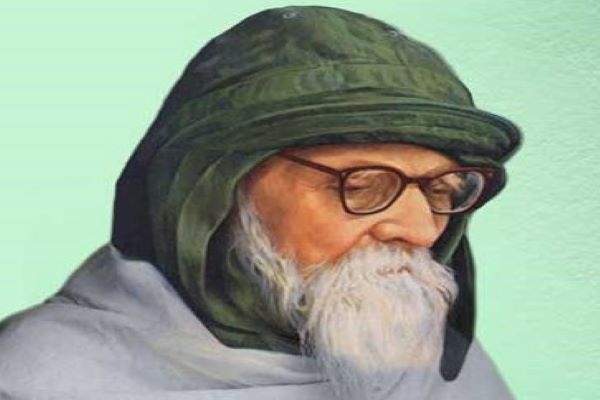Remembering a man who not only conceptualized, but lived ‘Sarvodaya’…
Total Views |
New Delhi, September 11: India got very few leaders who, instead of abandoning, continued with their principles even after Independence. Today is the 124th birth anniversary of such a saintly individual, the spiritual successor of Mahatma Gandhi – Acharya Vinoba Bhave.

Born on September 11, 1895, at the village of Gagoda in Kolaba district of Maharashtra, Vinoba was named Vinayak at birth and was influenced by his mother Rukmini Devi, a religious woman. Vinoba was a well-read in the writings of Maharashtra's saints and philosophers at a young age and deeply interested in Mathematics. In 1916, He marched to Varanasi with a longing to attain the imperishable and all-pervading Brahma. However, on a call by Mahatma Gandhi, he met Gandhi the same year, the meeting which changed his life.
Over the years, the bond between Vinoba and Gandhi grew stronger. Vinoba participated with keen interest in the activities at Gandhi's ashram, like teaching, studying, spinning and improving the life of the community. Asked by Gandhi to take charge of the ashram at Wardha, Vinoba went to Wardha on April 8, 1921. Vinoba continued his search for the self which took him to spiritual heights. His involvement with Gandhi's constructive programmes related to Khadi, village industries, new education (Nai Talim), sanitation and hygiene also kept on increasing.
Along with his pursuit of self, Vinoba remained active in freedom movement till independence. In 1923, he was jailed for months at Nagda jail and Akola jail for taking a prominent part in the flag satyagraha at Nagpur. In 1925, he was sent by Gandhi to Vykon (in Kerala) to supervise the entry of the Harijans to the temple. In 1932, he was jailed for six months to Dhulia for raising his voice against the British rule. In 1940, he was selected by Gandhi as the first individual satyagrahi. He was jailed thrice during 1940-41 for individual satyagraha at Nagpur jails; first time for three months, second time for six months and third time for one year. Vinoba was not known nationally when Gandhi selected him for individual satyagraha. Gandhi had issued a statement on October 5, 1940 introducing Vinoba. It was stated there that "Vinoba believes in the necessity of the political independence of India. He is an accurate student of history. But he believes that real independence of the villagers is impossible without the constructive programme of which khadi is the centre." Vinoba took part in the Quit India movement of 1942 for which he got an imprisonment of three years at Vellore and Seoni jails.
The idea of Sarvodaya Samaj (society) started getting acceptance after independence. In the beginning of 1950, he launched the programme of kanchan-mukti (freedom from dependence on gold, i.e. money) and Rishi-Kheti (cultivation without the use of bullocks as was practised by Rishis, i.e. the sages of ancient times). On April 18, 1951, his meeting with the villagers at Pochampalli opened a new chapter in the history of non-violent struggle. The Harijans of the village told him that they needed 80 acres of land to make a living. Referring to this, Vinoba asked the villagers if they could do something to solve this problem. To everybody's surprise, Ram Chandra Reddy, a landlord, got up and showed his willingess to give 100 acres of land. This incident, unplanned and unheard, showed a way to solve the problem of the landless. The Bhoodan(Gift of the Land)movement was launched. The response to the movement was spontaneous. In Telangana, the gift of land averaged 200 acres of land per day. On the journey from Pavnar to Delhi, the average gift was 300 acres a day.
Vinoba knew the strength of the padayatra (march on foot). He walked for 13 years throughout India. He covered thousands of miles, addressed thousands of meetings and mobilized the people cutting the barriers of caste, class, language and religion. Some dacoits from the notorious Chambal Valley (a hideout of dacoits in the northern India) surrendered themselves to Vinoba in May 1960. For Vinoba, it was a victory of nonviolence.
Vinoba Bhave connected science with spirituality and the autonomous village with the world movement. He regarded the power of the people superior than power of the state. Many of his ideas remain relevant and inspiring in the strife-ridden modern times.
Vinoba was a prolific researcher of Gita. He wrote ‘Gitai’ (Marathi translation of Gita) in the Dhulia jail. The jails for Vinoba had become the places of reading and writing. Writing of the book "Swarajya Shastra" (the treatise of self-rule) and the collection of the bhajans (religious songs) of the saint Gyaneshwar, Eknath and Namdev were completed. In Nagpur jail, `Ishavasyavritti' and `Sthitaprajna Darshan' were written in the Seoni jail. Four languages of the South India were learnt by Vinoba at Vellore jail and the script of Lok Nagari was also created here after research.